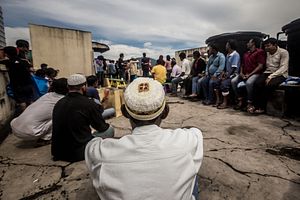On November 21, 2015, five individuals were arrested in Myanmar for publishing materials “that could damage national security.” Their offense? Printing calendars. It sounds surreal but such is the reality in the age of the “War on Terror.” Daily and mundane activities can and have been prosecuted by states under the rubric of “protecting national security,” targeting not only dissidents but regular civilians going about their daily lives.
That’s what happened to Kyaw Kyaw, the owner of a printing company in the capital city of Yangon, when he and four of his colleagues were detained, made to plead guilty and pay a fine of $1 million Khyat ($770 USD) after which they were released. The release was short lived: the five were rearrested only three days later on charges that they violated article 505(b) of the Burmese penal code, which states that publishing material “with intent to cause, or which is likely to cause, fear or alarm to the public or to any section of the public whereby any person may be induced to commit an offence against the State or against the public tranquility.”
Kyaw Kyaw’s printing company was asked to make the calendar, which referred to the Rohingya as an ethnic group, by Aung Khin from Sittwe, the capital of Rakhine state. Police allege that after hearing about the arrests of the five in Yangon whom he contracted to make the calendar, Aung Khin was also a suspect, and remained “at large.” Considering the fact that being in police custody in Myanmar might mean the end of your life, torture, and other forms of abuse, it is understandable why Aung Khin would be hesitant to turn himself into authorities, especially for an “offense” as absurd as printing calendars.
The Kafkaesque dance that Burmese military authorities engage in to deny and erase the existence of the Rohingya from the nation’s history is most virulently expressed in the Islamophobic platform of the military-allied extremist Buddhist nationalist organization, Ma Ba Tha. Indeed, it was the Ma Ba Tha that originally campaigned for the arrest of the Rohingya Calendar Six.
Commenting on the Rohingya calendar, leading Ma Ba Tha monk Parmaukkha said, “Regarding the calendar, we cannot accept it at all because we do not have Rohingya in our Myanmar history.” Since the arrest of the makers of the Rohingya calendar, the Ma Ba Tha has sent a representative to every trial hearing.
This is a familiar scenario: (i) the Ma Ba Tha manufactures campaigns against an individual or issue that is related to Muslims or Rohingya, and (ii) governmental authorities then get involved on the side of the Ma Ba Tha, claiming they are responding to popular opinion and enforcing the rule of law.
The nexus between the military and the Ma Ba Tha goes well beyond the above scenario. An important documentary by Al Jazeera this past October brought together Yale Law School and evidence uncovered by Fortify Rights directly implicating the military-led government in a campaign of genocide against the Rohingya. Opponents of military rule hold it as common knowledge that Ma Ba Tha’s ties to the military are deep and extensive, as Al Jazeera notes:
“It is also believed that the Committee for the Protection of Race and Religion — known by its Burmese acronym Ma Ba Tha — is supported by the military-backed government. Wirathu is the movement’s spiritual leader. Al Jazeera‘s ‘Genocide Agenda’ investigation includes accounts from monks who led the Saffron Revolution in 2007, who say Wirathu offered them money to join what would become Ma Ba Tha.”
The Rohingya Calendar Six are not alone. Just a few days ago, three interfaith workers, targets of a Ma Ba Tha campaign, were sentenced to two years of jail and hard labor under false pretexts. Zaw Zaw Latt, a former member of Aung San Suu Kyi’s National League for Democracy, was among those sentenced. On a charity trip to the Kachin region of Myanmar in 2013 he took a picture holding a gun at a Kachin Independence Army (KIA) camp, after which he was accused of “communicating with an illegal organization.” For two years no charges were brought — it was after all an innocent (if unwise) picture — until the Ma Ba Tha got a hold of it and started harassing Latt, smearing him as “a terrorist on social media.”
More bizarrely may be the sentencing of 12 Muslims for joining what The Intercept described as “a terrorist organization that defense lawyers and security experts say does not exist.”
Such cases exemplify the deleterious way in which the “War on Terror” has affected Burmese state policies. As The Intercept notes, it was only after the “War on Terror” was launched in 2001 that “Myanmar’s Muslims began to be presented as a potential terrorist threat.”
The corrosive effects of the war are plain to see from Guantanamo to Yangon. It is destroying the fabric of nations and many lives along the way. In Myanmar, instead of exerting pressure on the actual hatemongers, the military government encourages persecution of those working for a pluralistic and democratic future. The Rohingya Calendar Six, the jailed interfaith activists, and the 12 Muslims sentenced for joining a non-existent terrorist organization are all casualties of the wedding of Burmese state sponsored Islamophobia and the U.S.-led “War on terror.” As they languish in Burmese prisons, Americans would do well to remember our nation’s complicity in their plight.
Tauseef Akbar holds a BA in English with a concentration in Creative Writing and an MA in Islamic Studies. He is a researcher and web content manager at the Burma Task Force USA.

































